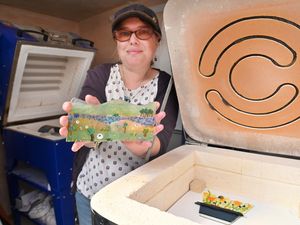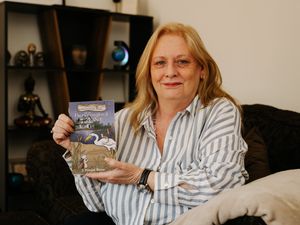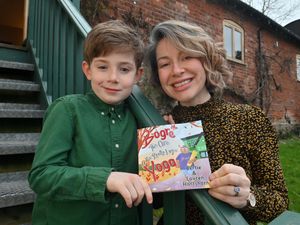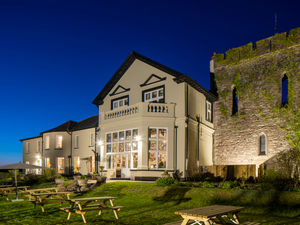Robert Plant interview: Why Led Zeppelin legend still loves the Beverly Hills of the Black Country
Even during a sound check, Robert Plant commands the stage.
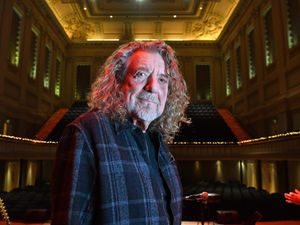
His bandmates have been tuning up, tweaking the microphones and practising their chords for a while. But the room goes quiet and heads turn the moment Plant enters the stage. Even his instructions to the lighting engineer have a theatrical edge to them.
"These are the lads from the city of the gold-and-black temple," he tells the sound crew as the takes the microphone at Birmingham Town Hall, a reference to his other great passion, Wolverhampton Wanderers.
And while his exploits with Led Zeppelin, Band of Joy, his collaborations with Jimmy Page and Alison Krauss – not forgetting of course his legendary solo work – has made him a global star to rival the likes of Mick Jagger, Freddie Mercury or Jim Morrison, he remains very much a man of the Midlands. If he's not performing or listening to music, there's a good chance he will be enjoying a pint in his local or watching his beloved Wolves.
Which brings us neatly to his latest musical venture, Saving Grace, which began as a collaboration rooted in his local pub.
"It's an undercover, underground, musical revolution," says Plant, with a glint in his eye.
"I was travelling all over the world, but when I came back to the Black Country, or as near enough as dammit, I really wanted to continue to sing, and I found The Swan in Stourport."
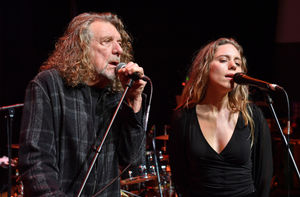
Run by guitarist Matt Worley, The Swan is a pub with a strong musical tradition, and Plant was spotted singing alongside guitarist Rob Tennant from Seisdon during a visit in 2016. It was there that he saw vocalist Suzi Dian and drummer Oli Jefferson performing, as well as guitarist Tony Kelsey, and Plant thought their diverse range of talents would make an interesting combination if brought together in a band.
"Suzi and Oli already had a really big reputation in this area," he says.
"Everyone here has their own history and reputation, that is very important."
Saving Grace plays a slow, soulful type of music, borrowing heavily from 19th century American folk music, and with psychedelic sound effects. Plant admits it is a sound that is hard to characterise.
"A lot of people call it Americana, but it is definitely not Americana," he says. "I would describe it as psychedelic soul."
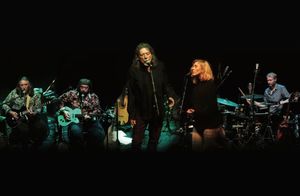
His next, and final concert of 2021, will be at West Midland Safari Park on December 23, not far from his home in Shatterford, near Kidderminster. He says he is keen to recreate the intimacy of the venues he attended and performed in during his youth.
"The venues are important," he says.
"When I was a kid we would go to Dudley Town Hall, Stourbridge Town Hall, or Coventry Town Hall and you could see the Rolling Stones and all the other bands of that level.
"Today, if you are a group as big as the Stones, you will be playing at Wembley, it's all very different.
"It will be very well organised, very professional, but you don't have that interaction with the audience."
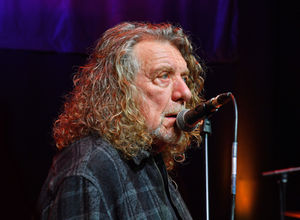
He recalls on particularly energetic performance from his early days.
"It was at Stourbridge Town Hall, and the sweat was coming off the stage," he says.
"You were so close to the audience, but that's how it used to be."
He speaks of his sadness at news that the Dudley Hippodrome is to be demolished.
"I always assumed it was a listed building," he says. "I would have thought they would have been able to at least keep the frontage."
But back to football, and the burning question that has puzzled football fans for decades: How does someone born within walking distance of West Bromwich Albion's football ground end up as one of the most famous supporters of arch-rivals Wolves?
Plant chuckles, and says it is time to put that one to bed once and for all.
"I was born in West Bromwich, in Lodge Road, in the same room as the bloke out of Thin Lizzie, although I was a year before," he says.
"But I was only there for a few hours. My grandmother took me over the boundary to Great Bridge as soon as possible, and I lived in Park Lane, Tipton. Had I known, I wouldn't have come out, I would have stayed in for a while longer."
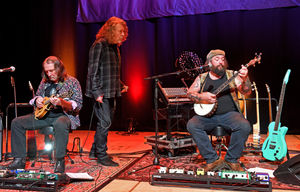
Robert Anthony Plant was born on August 20, 1948, into a musical family. His father, also called Robert, had played the violin as a young man, before focusing on his career as a civil engineer and bringing up a family. He was also a painter, a hobby he rekindled on his retirement. But young Robert's talent for music may also have come from his grandfather, Robert Shropshire Plant, who was the founder and leader of the Vono Revo Works Band, in the Dudley Port area of the Black Country.
Vono, the bed manufacturer, and Revo, which specialised in electrical equipment, were major employers in the postwar Black Country, and in those days playing in a brass band was an important leisure activity for factory workers.
"They were a pretty serious, renowned band, also known as the Dudley Port Drinking Band," he says.
"He played trombone, then he played violin in the orchestra pit behind silent movies, and stuff on the piano.
"I've got lots of pictures of my grandad and his dad in their bands, there is a picture of them in the bandstand in Tipton Park."
The Plants settled in Causey Farm Road in the Hayley Green area of Halesowen when Robert was a child, living in a pleasant tree-lined avenue on the edge of the North Worcestershire countryside, in the shadow of the Clent Hills.
Elvis Presley provided the soundtrack to his 1950s childhood, and in a 1994 interview he recalled how he would emulate his hero from behind the curtains of his home.
"When I was a kid, I used to hide behind the curtains at home at Christmas, and I used to try and be Elvis," he said in a 1994 interview," he said.
"There was a certain ambience between the curtains and the French windows, there was a certain sound there for a 10-year-old. I always wanted to be a bit similar to that."
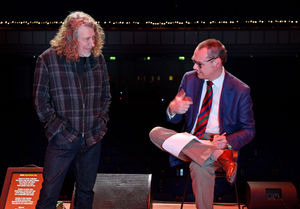
He attended King Edward VI Grammar School in Stourbridge, and it was during his mid teens that his musical taste diversified, developing a strong passion for the blues, and Willie Dixon and Robert Johnson in particular.
At the age of 15, he appeared on stage for the first time, filling in for the vocalist in a band called The Jurymen. The group was based at The Bull's Head pub in Pedmore Road, Lye, and was kept by the grandfather of guitarist John Dudley.
John remembered being mystified by 15-year-old Robert's mature taste in music.
"Rob was so much into the kind of music that we weren't," he later recalled. "I mean, where on earth he got the knowledge he had of the blues from I don't know. He was forever going on about people like Sonny Boy Williamson and from that age."
Plant recalls one performance with the Jurymen in Swadlincote:
"I looked down over the audience into the eyes of true love: to my right, to my left, and a blonde true love over there. From that moment, I knew what I wanted to do."
After leaving school in his mid teens, Robert managed a fortnight training to be an accountant, before deciding office life wasn't going to be for him.
"I left home at 16, and I started my real education musically, moving from group to group, furthering my knowledge of the the blues which had weight and was worth listening to."
The Seven Stars pub in Stourbridge became a major attraction for the young Robert Plant when it staged folk and blues nights. A local line-up called "The Delta Blues Band" performed there and it wasn't long before Robert persuaded these much older musicians to let him get up and perform a few songs with them.
He joined his first professional recording group, Listen. The mod-style band played in the Walsall area, and would become the first of several bands he would play in before he joined the Crawling King Snakes, bringing him into contact with future Led Zeppelin drummer John Bonham.
His life changed forever in 1968 when former Yardbirds guitarist Jimmy Page was looking for a new lead singer, but was turned down by his first choice Terry Reid. Instead Reid suggested Page go to a concert at a teacher training college in Birmingham, where Plant was singing in a band called Hobbstweedle. Page recalled being mesmerised by Plant's vocal range as he sang Jefferson Airplane's Somebody to Love, but was sceptical about why such a talent had not already made the big time.
"I immediately thought there must be something wrong with him personality-wise, or that he had to be impossible to work with, because I just couldn't understand why, after he told me he'd been singing for a few years already, he hadn't become a big name yet," said Page.
"So I had him down to my place for a little while just to sort of check him out, and we got along great."
Plant said he was immediately interested in Page's offer, because of his work with the Yardbirds, which had done a lot of work in the US, making it an obvious fit. With Bonham on the drums, the New Yardbirds moniker was quickly dropped and the band became Led Zeppelin.
It was a Saturday job at Woolworth's in Halesowen, though, that opened the door to this exciting new world, earning him enough money to buy a five-bob ticket to see his heroes perform at Stourbridge Town Hall.
"The curtain would pull back and there would be Gene Vincent, Screaming Lord Sutch or the Pretty Things," he says.
"Everything seemed otherworldly, even the gels used in the spotlights.
"Suddenly my mates in the lunatic fringe at school had pointed shoes and slicked-back hair and the girls wore petticoats. "Everyone was getting ready to become mods, and all this played out among blood, sweat and cheap perfume on a maple sprung dancefloor.
"To me, Stourbridge was the Beverly Hills of the Black Country."
Saving Grace featuring Robert Plant will be performing at Treetops at West Midland Safari Park in Bewdley on December 23. The show starts at 7.30pm. Tickets are available from eventbrite.co.uk.

